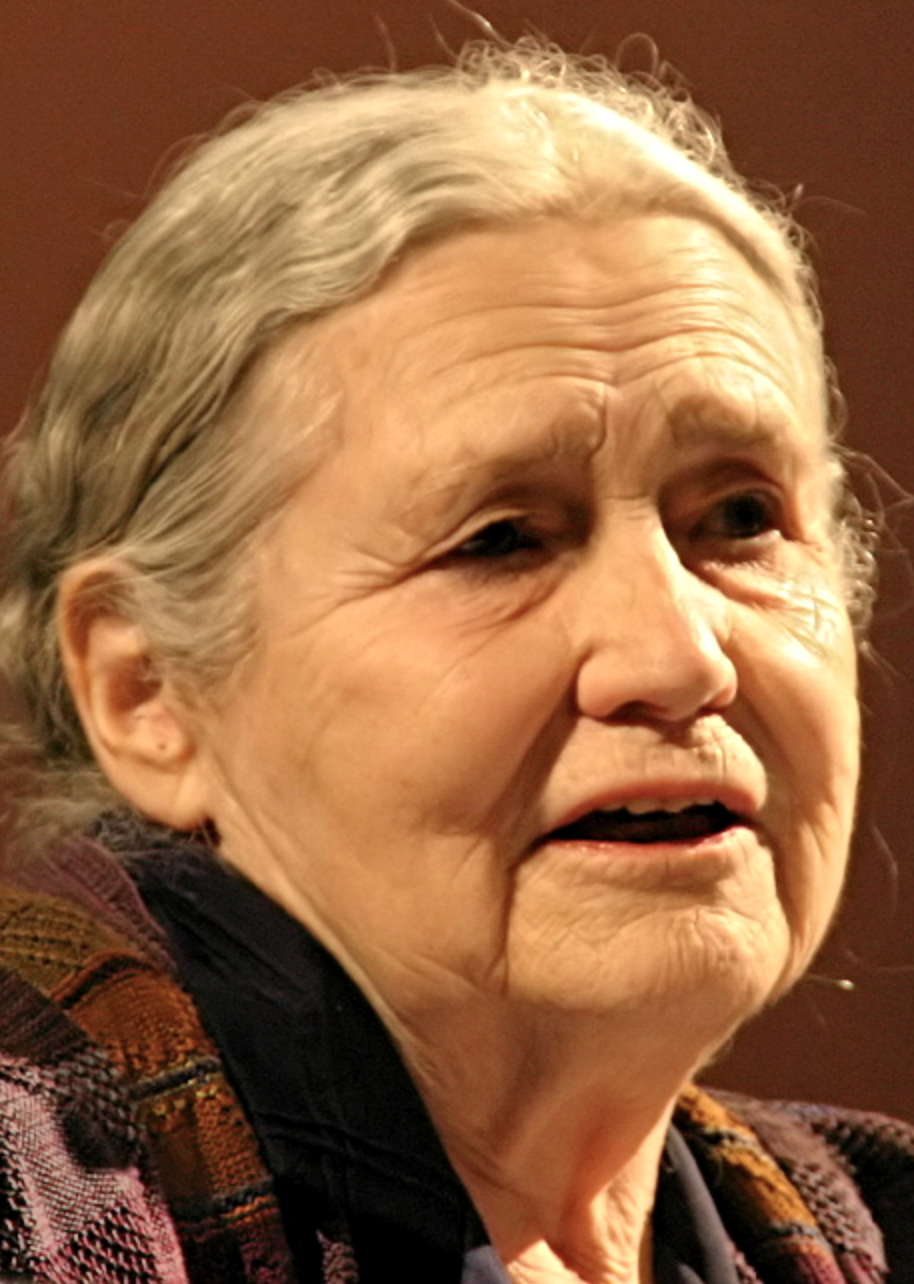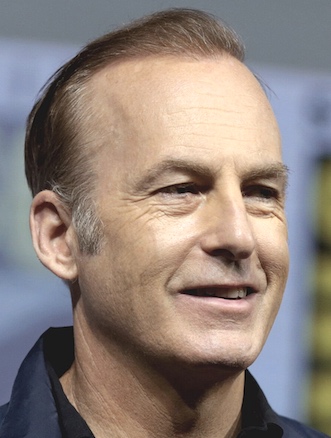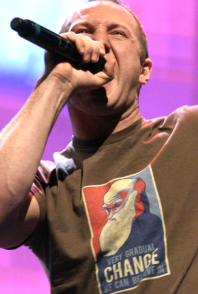October 22
Doris Lessing

On this date in 1919, novelist Doris Lessing (née Doris May Tayler) was born in Persia (now Iran) to British parents. She moved with them to the British colony of Southern Rhodesia (now Zimbabwe) in 1925. Her childhood, a mixture of idyllic and difficult, ended prematurely when she was sent to a convent school, where she was terrified by the nuns and their tales of sin and damnation, according to a Reader’s Guide to The Golden Notebook and Under My Skin (1995).
A temporary attraction to Catholic ritual was dispelled when her mother described the horrors of the Inquisition, at which point Lessing “quit religion,” according to literary critic John Leonard. Her formal education ended when she dropped out of an all-girls high school at age 13. She left home at 15, married Frank Wisdom at 19 and had two children before divorcing in 1943. She then married Gottfried Lessing and had another son before divorcing in 1949. She never married again.
Her first novel, The Grass is Singing, was published in 1949, the year she moved to London with her son. Her famed “Children of Violence” series (1951-59) features her heroine, Martha Quest, in a series of four coming-of-age novels. In 1956 she was named a “prohibited alien” by Southern Rhodesia and South Africa. The Golden Notebook (1962), with heroine Anna Wulf, was hailed as an early feminist classic. Her autobiographies were published in two volumes, Under My Skin, and Walking in the Shade (1997). She also wrote a series of science fiction books that were panned by some critics.
In analyzing a human propensity to dogmatism, including her own previous communist conversion, Lessing said, “There are certain types of people who are political out of a kind of religious reason. I think it’s fairly common among socialists: They are, in fact, God-seekers, looking for the kingdom of God on earth. … If you don’t believe in heaven, then you believe in socialism.” (New York Times, July 25, 1982.)
She was awarded the 2007 Nobel Prize for Literature at age 88, the oldest person at the time to ever receive the prize. The Swedish Academy called her “that epicist of the female experience, who with scepticism, fire and visionary power has subjected a divided civilisation to scrutiny.” (D. 2013)
PHOTO: Lessing at a 2006 literary festival in Cologne, Germany; photo (cropped) by Elke Wetzig under CC 3.0.
"You’d never believe, when I was young, we genuinely believed religious wars were over. We’d say, at least it’s impossible to have a religious war now. Can you believe that? … I’m so afraid of religion. Its capacity for murder is terrifying."
— Interview with Harvey Blume, "Doris Lessing: Hot Dawns," Boston Book Review, July 1, 1998 (date approximate)
Bob Odenkirk

On this date in 1962, actor and comedy genius Robert John Odenkirk was born in Berwyn, Ill., to Barbara (Baier) and Walter Odenkirk, the second of their seven children. His father worked in the printing business. Of German-Irish descent, Bob was raised Catholic in Naperville.
“My mom would have liked me to be a priest. A Roman Catholic priest, and a pope if I could get that far,” Odenkirk later said. “My father had no sense of who I was or that I did anything or would ever do anything or that I was a human being [laughs].” (Vice, May 30, 2017) Bob and his brother Bill kept the family entertained with their zany imitations. (Bill became a writer for “The Simpsons,” “Futurama” and other shows.) His father’s alcoholism eventually led to a divorce.
Asked how his Catholic upbringing affected him, Odenkirk said: “I have normal biceps, but my conscience muscle is a fucking hammer that can crush me or anyone around me at any time. I can experience guilt, shame and a critical, even damning, point of view of myself and everyone around me.” (Rolling Stone, April 5, 2017)
After short stints at the College of DuPage in Glen Ellyn and Marquette University in Milwaukee, he transferred to Southern Illinois University in Carbondale, honing his broadcast, sketch writing and performance skills at a college radio station.
He worked as a writer for “Saturday Night Live in 1987-91. During a summer hiatus with The Second City improv troupe in Chicago, he created the character “Matt Foley, motivational speaker” for castmate Chris Farley, which Farley later reprised with great success on “SNL.” Farley was “crack funny,” according to Odenkirk. “Somebody explained to me how freebase felt, and that’s what it was like to watch him. It was pure, unarguable, unquestionable. It wasn’t about cleverness. There was a lot of pain in Chris, but it was an expression of joy and humanity, and it was powerful. The best thing I ever got to be around in comedy.” (Ibid., Rolling Stone)
Relocating to Los Angeles, he joined the cast of “The Ben Stiller Show,” wrote for “Late Night With Conan O’Brien,” had a recurring role on “The Larry Sanders Show” and landed minor movie roles. “Mr. Show,” which he created with David Cross, ran on HBO for four seasons.
In 2009 he joined the cast of AMC’s “Breaking Bad” in the role of unscrupulous attorney Saul Goodman. It aired for five seasons until 2013. He started garnering more substantial film and TV roles and reunited with Cross in “W/ Bob & David” on Netflix. “Better Call Saul,” a “Breaking Bad” spinoff, debuted on AMC with Odenkirk in the title role in 2015. Its 63 episodes ended in 2022, the year he got his star on the Hollywood Walk of Fame.
Odenkirk starred as Tommy Wiseau’s character Johnny in a 2023 remake of “The Room,” which has cult status for its low production values and wooden performances. No release date was yet set in late 2023.
Odenkirk married film producer Naomi Yomtov, 12 years his junior, in 1997. They have a son, Nathan (b. 1998), and a daughter, Erin (b. 2000). Yomtov is Jewish, and the children were bar and bat mitzvah’d and educated in the Reform Judaism tradition, which Odenkirk admires. “It’s a connection to the ancient principles and beliefs that hold a lot of truth to us now and a belief in God that is complicated and complex and ever changing and growing in the way that a person over a lifetime who’s paying attention will also grow,” Odenkirk said. (Jewish Journal, Nov. 15, 2013)
Asked once if there was one day he would change from his past if he could, Odenkirk replied in the affirmative: “I can’t tell you what it is. I’m never going to fucking tell you. If it tells you anything about me, it should tell you that I was raised Catholic. Shame and guilt are big parts of [my] psyche, and they’re bigger than any dream of the future. You’re always wishing you could change the past.” (Ibid., Vice)
PHOTO: Odenkirk at the 2018 San Diego Comic-Con International; photo by Gage Skidmore under CC 3.0.
“Monty Python became my religion when I was 10. It led me out of the depths of darkness.”
— The Guardian (April 15, 2017)
Baba Brinkman

On this date in 1978, rap artist and playwright Dirk Murray “Baba” Brinkman was born in Riondel, British Columbia, to Joyce Murray — a member of the Parliament of Canada — and Dirk Brinkman Sr., founder of a reforestation company that has planted over a billion trees.
Brinkman, known for recordings and performances that combine hip hop music with literature, theater, science and other fields, got his nickname for his placid and contemplative facial expression as an infant. He worked in his parents’ business while growing up and earned a B.A. in English literature from Simon Fraser University and an M.A. in comparative literature from the University of Victoria. He studied human evolution and primatology with anthropologist Biruté Mary Galdikas. His master’s thesis compared the literary and cultural themes in Chaucer’s “Canterbury Tales” with those of hip-hop culture.
He transformed that into his one-man show “The Rap Canterbury Tales” premiering at the 2004 Edinburgh Festival Fringe. His 2010 “Rapconteur” featured hip-hop adaptations of “Beowulf,” the “Epic of Gilgamesh” and the Finnish “Kalevala.” Brinkman has called his style of rap lit-hop, also the title of his 2006 album.
In 2008, microbiologist Mark Pallen commissioned Brinkman to write a rap show about evolution. After listening to an audio version of “On the Origin of Species,” he wrote “The Rap Guide to Evolution” as an homage to Darwin. Performed Off-Broadway, it won the National Center for Science Education’s 2013 Friend of Darwin Award.
At a performance in Houston, its section titled “Natural Selection” fell flat before about 120 Texas collegians. “Every time I say ‘CREATIONISM IS?’ I want y’all to say ‘DEAD WRONG!’ ” he told students. Only half a dozen or so took part in the call and response, with the rest of the audience silent.
“About 15 people walked out in the first five minutes, shaking their heads in disgust,” recalled Brinkman. “At the end a bunch of the kids came up to me and they were like ‘Man, I thought that show was fantastic. I’m a creationist though, and I tell you that intro did not work for me.’ ” (The Scotsman, Aug. 19, 2010)
“The Rap Guide to Religion” premiered at the 2014 Edinburgh Fringe and also played Off-Broadway. Subsequent guides addressed the topics of the wilderness, medicine, climate chaos and consciousness. He and his wife, Ph.D. neuroscientist and TV host Heather Berlin, co-wrote and performed their cerebral comedy show “Off The Top” at Fringe in 2014, 2015 and 2017. They have a daughter, Hannah (b. 2013), and a son, Dylan (b. 2016).
A headline on The Humanist website called him “Atheism’s Best Salesman” in 2015. “I don’t see religion itself as a problem, but I see a lot of the problems of the world as a direct result of the religious mindset. … The question is: Why do we have all these beliefs that contradict demonstrable reality? Why do people cling to them even when they’re shown things that really, clearly contradict them?” Asked if evolutionary psychology offered an answer, Brinkman said, “Absolutely. It’s the key to the lock. I’m zeroing in.” (The Scotsman, Aug. 19, 2010)
Brinkman was a guest on FFRF’s TV talk show “Freethought Matters” that aired in September 2023.
PHOTO: Brinkman performing in Chicago in 2010; Greg Edwards photo under CC 3.0.
Cause if there is a personal God, then he's been jerkin' off
So why would he bother designing an albatross
Especially when natural selection does such an excellent job
Just by balancing benefits and costs?I say banish God into the gaps
If he can't help us understand the simplest facts
I want a relaxed God of infinite naps
We'll be all right without him, just give us a chance.The weak and the strong, who got it goin' on
We lived in the dark for so long
The weak and the strong, Darwin got it goin' on
Creationism is dead wrong.— Excerpt from Brinkman's "Natural Selection" in "The Rap Guide to Evolution" (2009)
